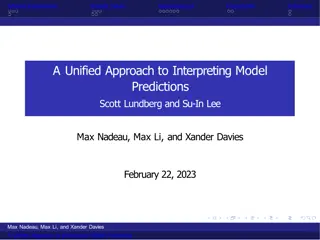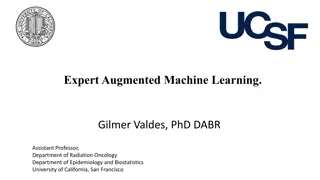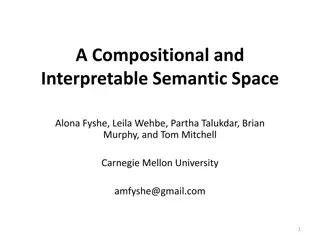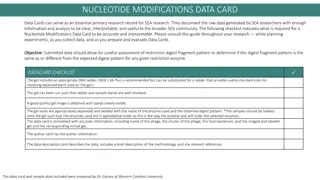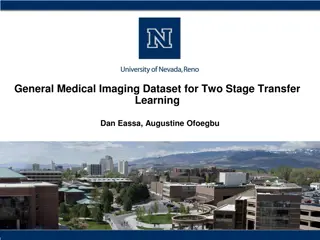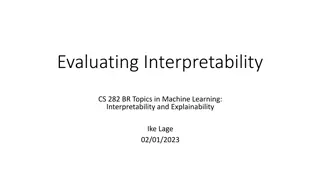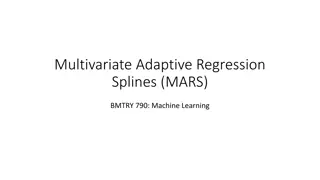Ethical Considerations in AI: Representation, Bias, and Fairness
Exploring the ethical dimensions of artificial intelligence (AI) reveals the unique position AI systems hold in behaving ethically. From causality to interpretability, bias, and privacy concerns, this discussion sheds light on the importance of ethical considerations in AI development and implementa
1 views • 25 slides
Enhancing Counterfactual Explanations for AI Interpretability
Explore how to improve interpretability of AI models through generating counterfactual explanations with minimal perturbations and realistic, actionable suggestions. Addressing limitations of current methods and the need for a more flexible generative framework to ensure explanations are clear, conc
5 views • 13 slides
Recent Advances in Large Language Models: A Comprehensive Overview
Large Language Models (LLMs) are sophisticated deep learning algorithms capable of understanding and generating human language. These models, trained on massive datasets, excel at various natural language processing tasks such as sentiment analysis, text classification, natural language inference, s
2 views • 83 slides
Exploring Counterfactual Explanations in AI Decision-Making
Delve into the concept of unconditional counterfactual explanations without revealing the black box of AI decision-making processes. Discover how these explanations aim to inform, empower, and provide recourse for individuals impacted by automated decisions, addressing key challenges in interpretabi
1 views • 25 slides
Understanding Logistic Regression Model Selection in Statistics
Statistics, as Florence Nightingale famously said, is the most important science in the world. In this chapter on logistic regression, we delve into model selection, interpretation of parameters, and methods such as forward selection, backward elimination, and stepwise selection. Guidelines for sele
4 views • 33 slides
Understanding Mechanistic Interpretability in Neural Networks
Delve into the realm of mechanistic interpretability in neural networks, exploring how models can learn human-comprehensible algorithms and the importance of deciphering internal features and circuits to predict and align model behavior. Discover the goal of reverse-engineering neural networks akin
6 views • 31 slides
A Unified Approach to Interpreting Model Predictions
Unified methodology for interpreting model predictions through additive explanations and Shapley values. It discusses the relationship between Additive Explanations and LIME, introduces Shapley values, approximations, experiments, and extensions in model interpretation. The approach unifies various
1 views • 21 slides
The Importance of Interpretability in Machine Learning for Medicine
Interpretability in machine learning models is crucial in medicine for clear decision-making and validation by medical professionals. This article discusses the definitions, global and local explanations, tradeoffs between interpretability and accuracy, and reasons why interpretable models are essen
0 views • 39 slides
Exploring Compositional and Interpretable Semantic Spaces in VSMs
This collection of images and descriptions dives into the realm of Vector Space Models (VSMs) and their composition, focusing on how to make a VSM, previous work in the field, matrix factorization, interpretability of latent dimensions, and utilizing SVD for interpretability. The research addresses
0 views • 40 slides
Understanding Analytic Rotation in Factor Analysis
Factor analysis involves rotation of the factor loading matrix to enhance interpretability. This process was originally done manually but is now performed analytically with computers. Factors can be orthogonal or oblique, impacting the interpretation of factor loadings. Understanding rotation simpli
0 views • 42 slides
Comprehensive Guide for Nucleotide Modifications Data Card in SEA Research
Nucleotide Modifications Data Cards are vital primary research records that document raw data generated by SEA researchers. The checklist ensures accuracy and interpretability when analyzing restriction digest fragment patterns. Follow the instructions for obtaining genomic sequences and comparing v
0 views • 8 slides
General Medical Imaging Dataset for Two-Stage Transfer Learning
This project aims to provide a comprehensive medical imaging dataset for two-stage transfer learning, facilitating the evaluation of architectures utilizing this approach. Transfer learning in medical imaging involves adapting pre-trained deep learning models for specific diagnostic tasks, enhancing
0 views • 16 slides
Machine Learning for Cybersecurity Challenges: Addressing Adversarial Attacks and Interpretable Models
In the realm of cybersecurity, the perpetual battle between security analysts and adversaries intensifies with the increasing complexity of cyber attacks. Machine learning (ML) is increasingly utilized to combat these challenges, but vulnerable to adversarial attacks. Investigating defenses against
0 views • 41 slides
Evaluating Interpretability in Machine Learning: Understanding Human-Simulatability Complexity
The paper discusses evaluating interpretability in Machine Learning by examining human-simulatability complexity and the relationship between decision set complexity and interpretability. It explores different factors affecting interpretability through user studies and highlights the significance of
0 views • 41 slides
Multivariate Adaptive Regression Splines (MARS) in Machine Learning
Multivariate Adaptive Regression Splines (MARS) offer a flexible approach in machine learning by combining features of linear regression, non-linear regression, and basis expansions. Unlike traditional models, MARS makes no assumptions about the underlying functional relationship, leading to improve
0 views • 42 slides






